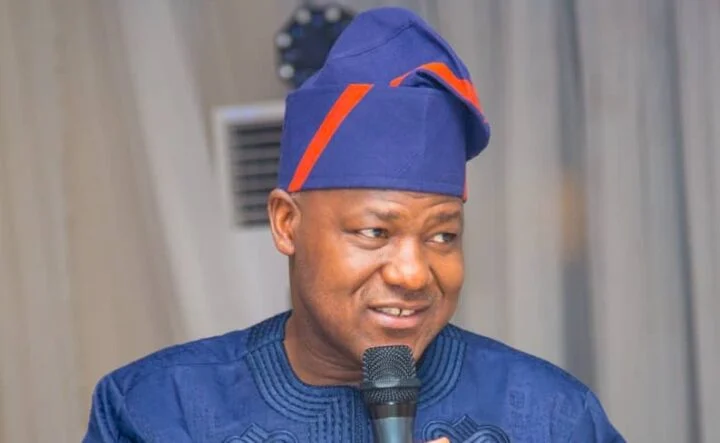By Adebari Oguntoye
Copyright newmail-ng

Yakubu Dogara, former speaker of the House of Representatives, says the nation’s economy was on the brink of collapse before President Bola Tinubu assumed office.
Dogara, who chairs the National Credit Guarantee Company (NCGC), spoke on Tuesday at the inaugural parliamentary lecture of the House of Representatives Press Corps (HORPC), themed ‘Navigating Tax Reforms in Nigeria: Insights on President Tinubu’s Policies.’
Dogara claimed that the previous administration printed and injected N22.7 trillion into the economy through “ways and means,” a policy he argued destroyed the value of the naira.
He said the existence of a dual exchange rate created a system in which a privileged few made hundreds of millions of naira from the Central Bank of Nigeria (CBN) forex allocations without producing goods or rendering services.
Dogara said loans were obtained to defend the naira, noting that such measures were unsustainable and amounted to “voodoo economics.”
TheCable has not independently confirmed whether the administration of former President Muhammadu Buhari obtained loans to defend the naira.
“Before delving into the subject matter proper, it is important to provide some context so that we don’t think the reform [Tinubu’s reforms] came out of the blue or that it was some kind of ego trip embarked upon by the government,” Dogara said.
“By the time President Tinubu took office, the economic debris of the nation had become too conspicuous to be ignored. N22.7 trillion had been printed and injected into the economy in the name of ways and means, thereby destroying the value of the naira in our pockets.
“Also, the dual exchange rate meant that some anointed people were making hundreds of millions of naira off forex allocations from the CBN without producing any goods or offering any services whatsoever, and tying our crude sales to foreign loans in the name of forward sales of crude was fast becoming the order of the day.
“Some of the foreign loans had been procured in order to help strengthen the naira, a measure that could only be sustained by voodoo economics.
“So from day one, it was very clear that something urgent, nay revolutionary, must be done to prevent our economy from imploding.
“So the president’s job as an economic reformer began on day one. Every reformer knows that progress is not promised; it is always fought for.
“All that a reformer is bothered with is to do the right things, not to have all things under control. As a matter of fact, if everything seems under control, it is not only an indication that you are not going fast enough, but also that you are most probably not a reformer.
“As a tested democrat, Mr. President knows that for our democracy to be worth its name, it must offer more than political and individual freedoms; it must offer economic choices that will lead to economic justice, most especially for the vulnerable who are least likely to recover from economic shocks.”
Dogara said one of Tinubu’s key reforms is repealing and reenacting obsolete tax laws.
He said the presidential committee on fiscal policy and tax reform chaired by Taiwo Oyedele proposed “revolutionary reforms” for Nigeria’s tax system.
Dogara said Nigerians who opposed the tax bills did so, hoping Tinubu would fail.
“Reform efforts often face significant opposition from those who benefit from the status quo, requiring strategic planning, persistent advocacy, and coalition-building to overcome these obstacles.
“This was no exception. The opposition to the reform was fierce and furious, almost foisting negative solidarity, which could lead to a race to the bottom and collective decline, where everyone is forced to endure worsening conditions because no one feels capable of improving them.
“While I want to avoid interrogating motives, at some point, it was clear that most of those opposed to the reform desired to see the President fail rather than succeed.
“Therefore, they raised issues that, even if true, were trivial. But as it related to the core goals of the reform, the issues were both trivial and untrue.
“It was clear that the opposition was primarily motivated by something sinister other than a collective benefit or shared ideal.
“Casting the president as dictatorial rather than being decisive was the high point of the opposition meant to scupper the reform.Thankfully, Mr. President courageously held his line and refused to budge.”
He said Nigeria’s tax system has been a complex, “contradictory web of ordinances and acts for decades.”
Dogara said Nigeria’s 2025 tax reform is the “most audacious overhaul of our fiscal framework in decades and in response to long-standing fragmentation in the country’s tax law and administration.”
He said the new tax laws simplify the legal framework, broaden the tax base, strengthen compliance, and align selected rules with international tax practices.
“The reform forms part of a broader fiscal strategy that accompanies fuel subsidy removal and exchange-rate unification introduced by President Bola Ahmed Tinubu’s administration since 2023. I believe this is a vision we can all, in principle, support because a stronger Nigeria benefits us all,” he said.
“Tax reform is not a punishment. It is a pact. On our part, as citizens, we must accept that this reform is more than a policy change; it is a national conversation. It is us telling ourselves that we are ready to build the Nigeria we deserve.”
Dogara said the government must understand that tax reform is not about raising rates, but about raising trust.
“It is the covenant between a government’s promise and a people’s prosperity. This is because transparency is the engine of compliance,” he added.



